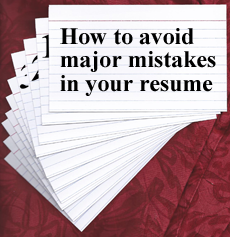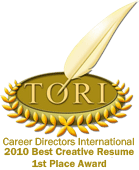 As a resume writer and career coach, I review thousands of resumes covering nearly every industry. Similar errors appear in many of them, errors that can derail your job search.
As a resume writer and career coach, I review thousands of resumes covering nearly every industry. Similar errors appear in many of them, errors that can derail your job search.
Here are 10 tips to help avoid common errors in elements of each resume section. Part 1 in the previous post reviewed the top four sections of a resume. This post will cover the remaining six.
5. Education
For the prospective employer, the purpose of the education section is to screen you out. Many jobs have specific requirements for a “Bachelor of Science in Business Administration” or “4-year degree.” To help your chances of being “screened in,” adopt the job description’s style for your degree. Alternatively, cover more bases by including the abbreviation along with the full spelling: Bachelor of Arts (BA) in Communications.
6. Certifications
The most common mistake I see in the content of the Certifications section is lack of information. When you write simply PMP or CCMA, the item can be missed, and it’s too important to take a chance on that. Better to spell out the certification, include the abbreviation in parentheses, include the certifying agency, city and state (or indicate that it was received online) and the month and year you completed the certification.
7. Volunteer Experience
There are two major reasons for including volunteer experience on your resume:
- It shows your world is larger than the commute between your garage and your designated parking space. Jobs that put you in touch with the public, such as sales, fund raising, and public relations, require a good deal of networking, so employers like to see that you have an existing set of contacts. Volunteerism is a great way to meet people without the pressure of prospecting.
- You don’t have a lot of paid experience in your target field, but you do have volunteer experience. When you’re in the first few years of your career or changing careers, volunteer experience can be a key to gaining paid experience. Show that you have the skills – if not the income – associated with a paid position.
8. Awards
Include awards in the Experience section instead of in a section by themselves. Usually awards are for stupendous production or amazing work, and they are going to show up in your accomplishments. To list them again in a separate section is redundant and takes up space better used for another accomplishment.
9. Interests
Most US employers don’t care if you play softball three evenings a week. In fact, saying so may be a negative if they’re going to worry you’ll break your arm and be unable to work for six weeks. Unless your interest has a direct bearing on your career, omit the section.
10. References
Unless specifically requested, references and mentions of references don’t belong on a resume at all. Most employers request references only from the top few candidates. Sending them early just annoys the computer. Employers know your references are “available upon request,” so that doesn’t need to be printed at the bottom of your resume. They will ask for them if they want them.
If you’re unsure if your resume is helping or hurting your job search, contact me right away. I would love to help you turn your job search into an interview-landing machine! (I never accept rush jobs and usually have a waiting list for projects, so contact me as soon as possible to ensure your project is timely.)
Related
- Resume content: Top 10 things you don’t know (Part 1)
- Beyond resume keywords: How to customize your skills list
- How to prepare for your resume update
- How to revise your targeted resume








